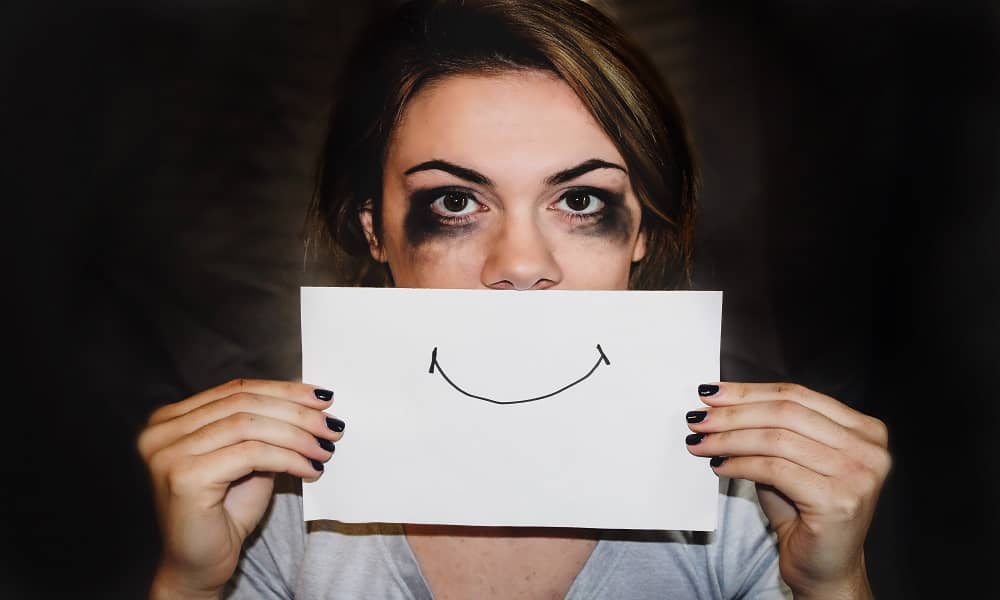


24 Sep What is Smiling Depression | Signs, Causes & How to Treat It?
Today, we find out how dangerous smiling depression is and what you can do about it.
Often, mental health issues don’t appear at the surface. Sometimes, it doesn’t come in the form of a blank face and gloomy expression. Instead, it’s a happy cheerful face, the one having a bright smile.
You might, in fact, have known someone of such character who ended up committing suicide. And this would surely have left you confused.
The truth is that they were never happy. All the time you saw them smiling, they were sinking deep into the abyss of depression.
Faking a smile is so much easier than explaining why you are sad.
But while a fake smile may prevent you from sharing your grief, it soon digs your grave as well, and that’s what smiling depression is all about.
What is Smiling Depression?
Smiling depression is a commonly used synonym for walking depression or high-functioning depression.
The mental health condition and its diagnosis don’t make it into the American Psychiatric Association’s Diagnostic and Statistical Manual of Mental Disorders.
In addition, with sheer lack of awareness, people don’t even consider the habit of hiding pain behind a smile a mental health issue.
However, according to studies, the famous MASK OF JOY cult is vicious.
Indeed, they experience a surge in good mood with a positive event. This again strengthens the fake notion of happiness they cling to.
But as the condition isn’t present in the official diagnostic manual for mental disorders, there aren’t widely available statistics.
Still, researchers’ early prediction recounts almost 15 to 40 % of people having mental health conditions. Smiling depression may seem like the hyper phase of bipolar disorder.
‘Smiling depression’ is one of the most dangerous mental health issues affecting MILLIONS.
Signs and Symptoms: How Do I Know If I Have Smiling Depression?
While happiness may show everything is going great, teens are breaking down inside.
Dealing with the whole day’s affairs with a crumbling inner self is a pathetic experience. Most importantly, patients don’t really know what’s going on.


Still, these are a few early diagnosable symptoms of smiling depression:
- Overwhelming sadness and hopelessness
- Inadequacy of self-confidence and self-worth
- Anxiety
- Mood swings
- Problems in focusing and decision making
- Suicidal thoughts
- Feeling “too fast” or “too slow”
- Taking no pleasure in daily activities, but pretending otherwise
These signs help find out how to tell if someone has smiling depression or not. Still, it’s hard to point out smiling depression symptoms in teens.
They are really good at hiding their inner turmoil. This is why, in most cases, the mental illness goes unnoticed.
Thus, parents need to closely observe a few physical and behavioral signs.
The primary symptoms of smiling depression, particularly in teens, include:
- Excessive sleep or sleep deprivation involving day naps
- Body pains
- Headaches
- Weight gain or loss
- Restlessness and irritability
- A sensation of heaviness in the arms and legs
- Substance abuse
- Extreme reactions to what they see as criticism or rejection
A SMILE can hide a thousand tears.
This definitely rings true in the case of symptoms and signs of smiling depression.
Sometimes, it hides an ongoing chain of mental turmoil. However, this can lead to vicious outcomes in the long run.
To find effective solutions, it’s important to understand what caused the condition and the severity it can lead to.
What Causes Smiling Depression?
One of the primary smiling depression symptoms people share is the feeling of considering themselves not good enough.
They are stuck with a very poor self-image. Eventually, it feeds them with emotional numbness, unachievable high expectations, and self-critical behavior.
These folks try to be their perfect image. As a result, they require controlling people and the surroundings around them.
In a way, there’s a relationship between depression and perfection. And it can go the wrong way if a proper limitation and boundary don’t exist.
In fact, perfectionists have a higher risk of getting depression because of their unrealistic goals and presumptions of themselves and others.
When such high expectations shatter, they scuffle to overcome the regret. In the long run, the pattern results in worthlessness and even suicide attempts.
In case, if they don’t express their feelings, emotions can heap up. The accumulation of negative feelings and thoughts feeds on them over time.
The loop of this emotional scuffle results in further sadness and low self-esteem. But when questioning, is smiling depression dangerous, you must understand the factors involved.
Is Smiling Depression Dangerous? | The Risks



Early findings and experts’ reviews find this particular mental illness dangerous.
As a matter of fact, there’s an upsetting link between smiling depression and suicide.
According to a study, in comparison to a patient with no energy who stays in bed, a patient with chronic depression experiencing a sudden boost of energy is more likely to commit suicide.
Sudden traumatic events may trigger the dangers of smiling depression. It can be a job loss, divorce, or in the case of teens, public humiliation, bullying, or self-worthlessness.
In most instances, the condition goes unnoticed and untreated. This is simply because it doesn’t fit the common notion of depression in society.
Thus, everyone fails to notice it until a smiling face does something shocking.
Usually, teens appear cheerful, positive, and highly energetic. But deep down they only know what struggles they go through.
Sudden physical changes may make this phase even more frustrating. Sometimes, they don’t even know they are depressed.
Teens battling with depression generally feel alone, and the condition can make them more isolated. With proper treatment, they may self-harm themselves or even attempt suicide.
The solution then is to understand how to deal with smiling depression.
But that’s only possible when you know the reasons behind why people cover up their gloomy side with the happy face common among people with smiling depression.
Why Do I Hide My Depression?
It is quite common for people to hide their depression effortlessly.
It isn’t always about privacy, but the judgments as well. Sometimes, the reason can be professional or personal.
Here are some main reasons people deny their smiling depression symptoms publically.
#1. Fear of Burdening Others
Guilt and depression walk together. So, people don’t want to burden their loved ones with their problems.
This is most common in folks having a tendency to care for others more than they care for themselves. They often don’t know how to ask for help.
#2. Embarrassment
The common stereotype about depression is considering it as a weakness. Also, some believe you can directly snap out of the condition.
This does create an embarrassing situation for the one with depressive symptoms and might make coming out even more problematic.
#3. Denial
Smiling depression also gave rise to a constant denial of mental illness.
As long as they are cheerful, they find no issue of depression. Most don’t admit their struggle. Indeed, pretending is easier than showing yourself.
Constant denial ends up making you a prisoner of your own mind.
#4. Fear of Backlash
Many fear the personal and professional consequences of having depression. After all, no one would like to hire a depressed comedian for the job of a stand-up artist or a depressed dramatist to write comedy.
While some may think that their partner will leave them knowing the truth. In the minds of the depressive person, it’s better to lie than tell the truth and receive backlash.
#5. Concern About Appearing Weak
While smiling depression causes may differ, the patients have a constant fear of appearing weak.
They don’t want to appear feeble to make them feel vulnerable. In fact, it isn’t because they fear, but the chances of others using it as leverage against them are high.
Indeed, they put up a really strong boundary in an attempt to not show the side they perceive as weak.
#6. Guilt
Guilt and depression go hand in hand. People with depression feel they shouldn’t feel the way they feel—depressed.
This is where the smiling thing can begin. Again, leading to a whole new phase of mental illness.
In other words, they feel guilty for getting depression. The smile works as a cover-up for both guilt and depression.
#7. Unrealistic Views of Happiness
Social media showcases an unrealistic portrayal of happiness, which is far from reality.
People scroll through happy faces, vacations, achievements, and success stories.
This causes a vacuum and dissatisfaction inside them. It can be a precursor to a mental health issue. Their isolating behavior may even amplify.
#8. Perfectionism
Perfectionism isn’t just the art of perfect image-making. It can even trigger symptoms of smiling depression.
Unrealistic goals and constant failures to achieve them lead to dissatisfaction. Eventually, it aggravates the condition of smiling depression.
While people question— is smiling depression real or not— more and more teens are being diagnosed with the condition. So, it becomes our priority to create awareness about the smiling depression cure and treatment.
If parents don’t know how to treat smiling depression, it would be impossible to fight the mental condition.
How to Get Rid of Smiling Depression?
Smiling may reassure people around you that you are fine. But, at the same time, your condition isn’t noticeable and the treatments break. This is definitely bad.
Thus, it’s often best to seek a psychiatrist or another mental health professional for treatment for smiling depression.
However, what makes things difficult is people with depression may not want to share anything with anyone.
The patient with the condition usually has a fake front with the therapists as well. This can result in severe smiling depression symptoms.
The only way to combat the mental health issue is, to be honest about your feelings. And then your therapist may prescribe an antidepressant medication to help you.
Cure for Smiling Depression



Following are some of the most useful cures to treat the signs of smiling depression:
- Opening up to a trustworthy friend or a loved one. It may relieve a load of feelings you are holding on to.
- Practice meditation.
- Spend some time in nature outside.
- Make art, listen to music, or perform other activities you relish.
- Work out for even 10 to 15 minutes daily to pump up your mood.
- Seek a professional therapist.
Still, being yourself is the first step to fight off the condition. It gives an edge to your recovery.
While your friend or kid may be visiting a therapist, you can also take a few measures to help them as much as possible.
In fact, as a loved one, you might already be wondering, how to cure smiling depression? Well, here’s what you can do to extend your helping hands as a friend or family.
How to Help Someone with Smiling Depression: A Guide for Friends and Family
While your loved ones are struggling with mental illness and stepping forward to recovery, you can also support them.
A few mindful actions can give them strength and the will to be as before. Here’s how you can help:
#1: De-Stigmatize Mental Illness
The main reason behind mental illness is the desire to appear like a perfectionist. This prevents the patient from seeking help.
Only awareness and destigmatizing the condition can help people come to the forefront and be their true selves with all the goods and the bad.
Indeed, a healthy environment also benefits the ongoing therapy the patient may be going through.
#2: Pay More Attention
Rather than keeping everything bottled up, show your love and attention for the one with smiling depression.
This becomes necessary when you notice warning signs. If your friend suddenly stops responding to your texts, calls, and follow-ups, you should ask them about it.
Let them know they aren’t alone. You are there to listen to them. In case they are giving away possession, you need to immediately take some action.
If you want to help your family and friends, the only way to do that is to let them know they aren’t alone. Checking on close ones can delight them, in fact.
So, when they say they feel like they are in depression, have a thorough conversation and take them to a therapist, even if you think they are wrong.
Now, let’s clear up some doubts about this common mental health condition.
FAQs
Depression can get severe if you do not seek answers. These frequently asked questions can help evaluate common presumptions.
Final Words
Although smiling depression is yet to get an official entry in the mental illness list, it still accounts for 15-40% of depression cases.
This definitely makes smiling depression dangerous and something worth looking into.
What makes it even more frustrating is that it is extremely hard to observe the symptoms, making early diagnosis and treatment difficult.
The condition is more common among teens due to the expectations of unrealistic happy lives of social media.
Having bouts of self-loathing and worthlessness is common, but smiling depression takes it to a whole new level.
Thus, it becomes highly important to seek help than live in constant denial.
You need to leave your MASK OF JOY to know what it feels like to be happy in real life.
Have someone who can relate to the above? Share this blog with them to show you care.
ALSO READ:



No Comments